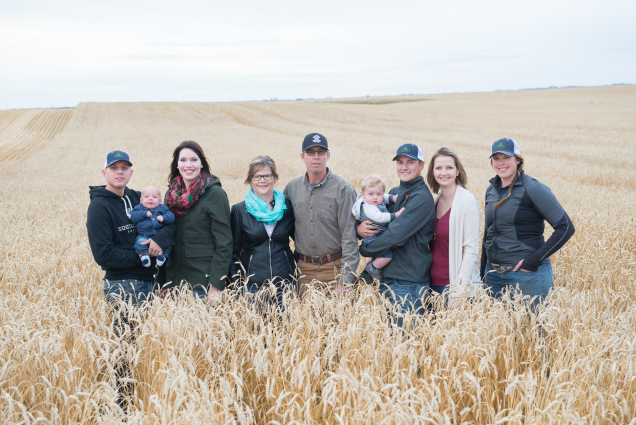Nobody understands the importance of sustainability like family farmers—and if we’re allowed to make basic, strategic farming decisions without interference, we can guarantee that agriculture will remain sustainable into the far future.
That’s what family farming here in western Canada has taught me.
 Our family farm in Saskatchewan is multigenerational, and we want to keep it that way. We stand on the shoulders of grandparents who struggled to start our operation, and we intend to pass it on in good health to our children and grandchildren, building a legacy.
Our family farm in Saskatchewan is multigenerational, and we want to keep it that way. We stand on the shoulders of grandparents who struggled to start our operation, and we intend to pass it on in good health to our children and grandchildren, building a legacy.
Families build and maintain farms today. About 97 percent of the farms in Canada are family owned. I believe that number holds in many other countries around the world. While many of the Canadian farms are bigger than they once were, especially where I live in the western provinces, they’re still owned and operated by families.
That’s why we believe so strongly in sustainability, which is a word that can mean different things to different people. It can involve everything from environmental conditions to economic viability.
Family farmers may have the most robust idea of sustainability. We take a long view that stretches across generations. We also have a personal stake. Our farm isn’t just an asset that we might buy and sell. It’s a legacy that we’ve inherited from our ancestors and that we intend to pass on to our descendants. We’re nothing if we’re not sustainable in every way possible.
An important part of sustainability is adaptation and progress. Farmers can have a reputation for resisting change—and it’s true that if something works well, we often prefer to keep doing it. Yet agriculture is changing all the time, as new strategies and technologies give us opportunities to improve what we do.
 The paradox of change is that you can know it’s coming but remain unable to prepare for it because you don’t know what shape it will take. In my life as a farmer, farming has both evolved slowly through incremental adjustments and taken forward leaps from remarkable innovation. If I could have seen a decade ago what our yard looks like today, with its machinery and tools and activity, I might not have believed it.
The paradox of change is that you can know it’s coming but remain unable to prepare for it because you don’t know what shape it will take. In my life as a farmer, farming has both evolved slowly through incremental adjustments and taken forward leaps from remarkable innovation. If I could have seen a decade ago what our yard looks like today, with its machinery and tools and activity, I might not have believed it.
We’ve made fundamental changes to our operations. Rather than broadcast applying fertilizer on our fields as we did in the past, for example, we now have a complete prescription-based, variable-rate application system that delivers precise amounts of fertilizer to specific locations when crops can take the best advantage of it.
 Many of our decisions depend on information that comes to us from weather stations with suites of sensors that monitor air temperature, soil moisture, relative humidity, leaf wetness, and more. Sensors are also in our machinery. In our combines, they help software determine harvesting speed, header height, and threshing and separating settings. In our sprayers, they determine nozzle pressure and engine speed. In our bins, they control aeration and run fans only when necessary to preserve the grain in long-term storage.
Many of our decisions depend on information that comes to us from weather stations with suites of sensors that monitor air temperature, soil moisture, relative humidity, leaf wetness, and more. Sensors are also in our machinery. In our combines, they help software determine harvesting speed, header height, and threshing and separating settings. In our sprayers, they determine nozzle pressure and engine speed. In our bins, they control aeration and run fans only when necessary to preserve the grain in long-term storage.
I never expected that we’d invest so heavily in sensors, but they are some of the smartest decisions we’ve ever made. They’ve improved our efficiency and sustainability. We expect to rely on them even more in the coming years, as new technologies allow sensors to provide real-time information on soil nutrition and plant health and allow for optical-spot spraying that helps us protect our crops from weeds, pests, and disease. I also foresee technologies that improve our methods of storage and render spoilage obsolete.
Artificial intelligence, if properly developed, could revolutionize what we do. Although we currently try to make decisions based on information and probabilities, a lot of farming is based on feel—it can still seem more like an art than a science. AI, however, could analyze records of our farm’s history of production with data on weather, soil, and provide concrete suggestions for how to make our crops more resilient and less dependent on inputs. AI also could reveal new ways to use fungicides and plant-growth regulators for the benefit of our food production.
I’m certain that in farming, the pace of change only will accelerate and continue to present surprising opportunities.
None of these past improvements have happened because of government regulators or political activists. Future improvements won’t depend on them, either. Instead, they will rely entirely on family farmers making the types of long-range decisions we’ve always made because of who we are and what we believe.
If we’re free to choose how to farm, we’ll choose sustainability.

